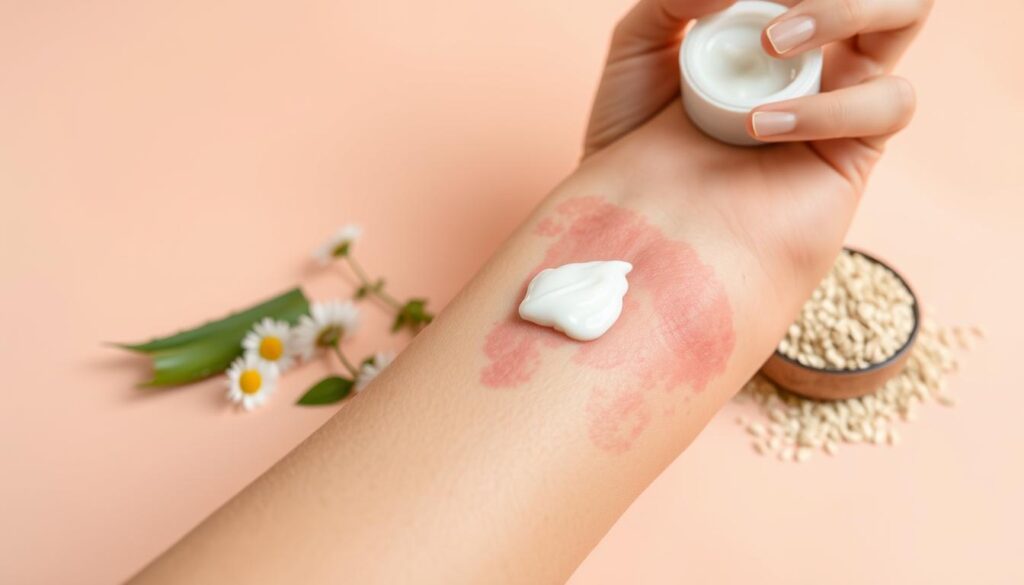Starting your journey to clear and vibrant skin can seem overwhelming. You’re not alone if you’re confused by skin issues. Our guide will help you find your way to healthy skin with effective solutions and treatments.
Whether you face occasional breakouts or chronic skin problems, there are remedies and tips to help. We’ll show you how to tackle your skin concerns with confidence and care.
Key Takeaways
- Recognizing common skin problems and their signs.
- Incorporating skin care solutions that cater to individual needs.
- Exploring a range of skin condition treatments from over-the-counter products to natural remedies.
- Emphasizing the importance of diet, lifestyle, and daily routines for maintaining healthy skin.
- Understanding when professional advice is needed for persistent skin issues.
- Adopting preventative strategies for long-term skin health and vibrancy.
Understanding Common Skin Problems

Learning about common skin issues can help find the right treatments. Conditions like acne, eczema, and psoriasis need a deep understanding. Knowing what causes them is key for both doctors and patients to find lasting relief.
Acne: Beyond Just Pimples
Acne isn’t just for teens; it can affect adults too. It’s linked to hormones, lifestyle, and environment. To treat acne well, you need more than just over-the-counter creams. It’s about diet, hygiene, and sometimes, prescription drugs.
Dermatologists say treating acne means fixing both the outside and inside problems. This helps stop it from coming back.
Eczema: Managing Itchy and Inflamed Skin
Getting relief from eczema starts with knowing what triggers it. Things like allergens, irritants, and stress can cause it. It makes skin dry, itchy, and inflamed.
Managing eczema means using special skincare and sometimes medicine. Learning to avoid triggers and customize your skincare is important. It helps reduce the pain and discomfort.
Psoriasis: A Closer Look at This Autoimmune Condition
Psoriasis is a long-term condition that affects the skin and can also hurt joints and organs. To manage it, you need a full plan. This includes creams, pills, and changes in your lifestyle.
Each type of psoriasis, like plaque or guttate, needs its own approach. A dermatologist can help find the best plan for you.
By understanding and managing acne, eczema, and psoriasis, people can live better lives. Dermatologists are always learning more. They work to find new ways to treat these conditions and improve life for those affected.
The Role of Diet and Lifestyle in Skin Health
Getting healthier, more radiant skin is not just about what you put on your skin. It’s also about what you eat and how you live. This part talks about how good food and healthy habits can make your skin look better and feel more alive. Every meal you eat is a step towards looking beautiful.
Hydration: Its Impact on Skin Appearance
Drinking enough water is more than just a beauty trick. It’s essential for keeping your cells healthy, including your skin. Water helps your skin stay elastic, reduces wrinkles, and helps get rid of toxins. Studies show that drinking water regularly can make your skin look more moist and bright.
Superfoods for Radiant Skin
Eating a skin-enhancing diet is more than just drinking water. It’s about eating foods full of antioxidants, vitamins, and minerals. Foods like berries, nuts, avocados, and leafy greens are packed with nutrients. They help fight off damage that can make your skin look older.
Exercise and Sleep: Their Import on Skin Well-being
A healthy lifestyle for healthy skin means exercising regularly and getting enough sleep. Exercise boosts blood flow, which feeds your skin cells. It also helps remove waste products. On the other hand, sleep is when your body fixes itself. Not enough sleep can lead to stress hormones that can make skin problems worse.
| Condition | Dietary Advice | Beneficial Nutrients |
|---|---|---|
| Psoriasis | Mediterranean, Gluten-free | Less sugar, Less red meat |
| Alopecia Areata | Gluten-free, Vitamin D focus | Supports hair regrowth |
| Vitiligo | Rich in antioxidants and vitamins | Vitamins B12, C, E |
| Acne | Low glycemic, Probiotic-rich | Reduces severity |
By eating well and living healthily, including getting enough rest and staying hydrated, you can get glowing, healthy skin. These habits help your skin repair and grow, giving you a natural glow. For more tips and advice, check out Healthy Human Source to improve your skincare routine.
Identification and Treatment of Skin Problems
Knowing when to see a dermatologist or use OTC products is key for good skin care. Learning about holistic skin care and prescription treatments helps you make smart choices for your skin.
When to Seek Professional Help
It’s important to know when you need a dermatologist. If your symptoms don’t go away or get worse, it’s time to see a pro. Early visits can stop serious problems like melanoma from getting worse. This shows how important expert advice can be.
Over-the-Counter Solutions vs. Prescription Medications
OTC products can help with many skin issues. But, for serious problems, you might need prescription treatments. Here’s a quick look at the difference:
| Treatment Type | Benefits | Typical Uses |
|---|---|---|
| OTC Skin Products | Accessible and cost-efficient | Minor acne, mild eczema |
| Prescription Skin Treatments | Targeted, potent formulations | Severe acne, psoriasis |
Choosing between OTC and prescription treatments depends on how bad your skin problem is.
Natural Remedies for Skin Care
Using natural remedies can help with your skin care routine. Aloe vera and tea tree oil are good for inflammation and acne. They are gentle but effective.
Knowing about all skin care options helps you take care of your skin with confidence and knowledge.
Preventative Strategies for Maintaining Healthy Skin
Keeping your skin healthy is all about prevention. This part talks about how to do it. It covers daily skin care, using sunscreen, and managing stress. These steps help keep your skin looking great.
Daily Skin Care Routines for Different Skin Types
Every skin type needs its own care. Here’s what works for each:
- For oily skin, use gel-based cleansers and light moisturizers
- Dry skin types benefit from cream-based cleansers and heavy moisturizers
- Combination skin requires a balance of light and nourishing products
- Sensitive skin should be treated with hypoallergenic and non-irritating substances
Don’t forget to exfoliate and keep your skin hydrated. This removes dead skin and keeps it moist.
The Importance of Sun Protection
Sunscreen is key to protect your skin. Use a broad-spectrum sunscreen with at least SPF 30. Reapply every two hours, after swimming or sweating.
Stress Management Techniques to Prevent Skin Flare-ups
Stress can harm your skin. To fight it, try mindfulness, exercise, and enough sleep. These can help your skin and overall health.
Using these prevention tips can make your skin and overall health better. Focus on daily skin care, sunscreen, and stress management. This way, you’ll have healthy and vibrant skin.
Conclusion
As we wrap up our journey through skin care, we highlight how important knowledge is. Knowing about common skin problems, diet, lifestyle, and prevention is key. This guide has given you the tools to handle skin issues with confidence.
Embracing skin wellness is a journey, not a one-time task. It combines professional treatments with natural remedies and daily routines. With the knowledge from this guide, you can make better choices. This includes knowing when to see a doctor and picking the right sun protection.
The goal of having vibrant, healthy skin is within reach. It’s about being proactive and informed about what affects your skin. Let this article be your guide through the world of skin care. By following these principles, you’re on your way to radiant skin and overall wellness.




